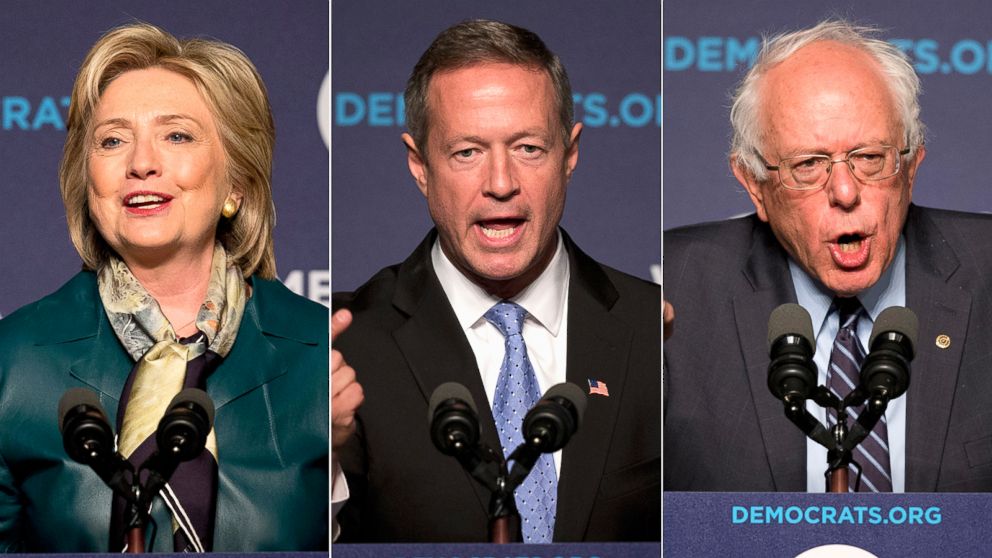Dem Debate Will Focus on National Security and Foreign Policy After Paris Attacks
The debate is being held at Drake University in Des Moines, Iowa.

— -- The terrorist attacks in Paris have changed CBS News' plans for Saturday night's Democratic debate "substantially," shifting to questions focused on national security and foreign policy.
"Last night's attacks are a tragic example of the kind of challenges American presidents face in today's world and we intend to ask the candidates how they would confront the evolving threat of terrorism," CBS News Washington Bureau Chief Christopher Isham told reporters in the debate hall at Drake University in Des Moines, Iowa.
It's high stakes for Bernie Sanders and Martin O'Malley entering the debate in Iowa, where the two Democrats have been campaigning heavily, but Hillary Clinton leads in the polls by double digits.
"We're still going to ask questions about domestic policy and issues that all Americans care about. But clearly, with the events of last night we need to change the focus somewhat," Isham said.
Front-runner Hillary Clinton enters the debate in strong standing. ABC News partner fivethirtyeight.com reported Friday that "Clinton has amassed a higher share of intra-party support before the Iowa caucuses than any presidential candidate since 1980, as far back as our data goes."
"Hillary Clinton has always been the default candidate and they need to be able to do something to unseat her from that position," Iowa Democratic strategist Grant Woodard told ABC News. "At this point, it has to be something pretty monumental.”
O'Malley and Sanders are expected to contrast themselves with each other and with Clinton, but it's unclear how negative the debate will go as attacks so far have been mostly indirect.
"The governor is making a forceful case for what sets him apart," O'Malley's national press secretary Haley Morris told ABC. "I think he has gotten more aggressive in the next stage of his campaign."
With Sanders, Woodard believes the key is to prove how his brand of politics will be successful in a general election.
"The vast majority of caucus-goers are willing to make sacrifices with candidates over gun control if they think that candidate is electable in a general election," Woodard said.
Woodard is referring to the first Democratic debate last month in Las Vegas where Sanders was criticized for his gun control record as senator of Vermont. For O'Malley, it may be one of his last opportunities to court Iowa voters 75 days out from the caucus.
"O'Malley -- a lot of people say that they like him, but between Clinton and Sanders they’ve basically sucked-up all the oxygen in this race," said Woodard.
The Clinton campaign told ABC News it's expecting O'Malley and Sanders to be better prepared and possibly go after the former secretary of state's record. The campaign said Clinton won't hesitate to fight back and she did not hold public events Thursday and Friday in preparation of the debate.
Sanders has been holding mock debates with staffers playing Clinton and O'Malley at a hotel meeting room in Burlington, Vermont. His campaign has pushed back on reports that Sanders plans to sharpen his attacks on Clinton.
"He wasn't sharpening new lines of attack," Michael Briggs, Sanders communications director, told ABC. "He doesn't even have old lines of attack. He's planning to talk about our rigged economy and corrupt campaign finance system."
In a CNN/ORC poll released earlier this month, Sanders trails Clinton by 18 percentage points in Iowa and that gap is even larger in South Carolina.
Debate moderator John Dickerson and his staff were in rehearsals when the news started to come out of Paris. CBS has partnered with Twitter for the debate and many of the questions submitted by Twitter users in hours since the attacks have also centered on Paris.
CBS News tells ABC that there were never discussions to postpone the debate.
"We thought it made the debate even more important. It gave it an immediacy and an opportunity to discuss this challenge and this threat," Isham said.




